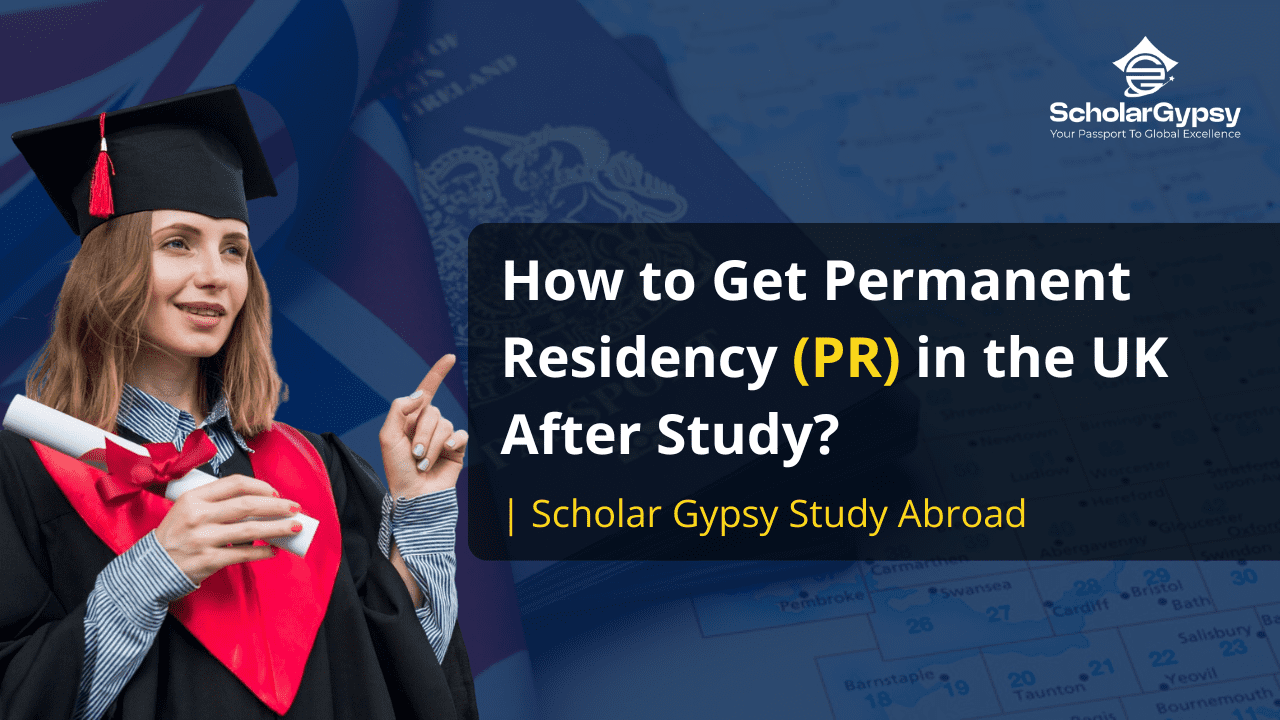Are you an international student dreaming of studying in the UK and eventually making it your permanent home? For many students from India, the ultimate goal is not only to complete higher education but also to secure a future in the UK through Permanent Residency (PR), also known as Indefinite Leave to Remain (ILR).
At Scholar Gypsy Study Abroad – the Top Study Abroad Consultancy in Kerala, Best Study Abroad Consultancy in Trivandrum, and Best Overseas Consultancy in Kerala – we guide students step-by-step through their study, work, and PR journey.
In this blog, we’ll cover everything you need to know about securing PR in the UK after your studies in 2025. To make it easy, here’s a quick overview of what you’ll learn:
✅ What is Permanent Residency (PR) in the UK?
✅ Difference Between UK PR (ILR) and British Citizenship
✅ Step-by-Step Guide to Getting PR in the UK After Study:
1. Complete Your Degree in the UK
2. Apply for a Post-Study Work Visa (Graduate Route)
3. Switch to a Skilled Worker Visa
4. Work in the UK & Meet Residency Requirement
5. Check UK PR Eligibility Criteria
6. Apply for Indefinite Leave to Remain (ILR)
7. Include Dependents in Your PR Application
✅ The UK PR Points System Explained (2025)
✅ Useful Advice to Boost Your PR Prospects
✅ FAQs: Timelines, Salaries, and Family PR Rules
✅ Why Choose Scholar Gypsy Study Abroad for Your UK Journey
What is Permanent Residency (PR) in the UK?
Permanent Residency, officially called Indefinite Leave to Remain (ILR), gives international students and professionals the right to live and work in the UK without time restrictions. With PR, you can:
- Live and work in the UK freely.
- Access public healthcare (NHS) and certain benefits.
- Apply for British citizenship after holding PR for 12 months.
Difference Between PR in the UK and British Citizenship
| Feature | Permanent Residence (ILR) | British Citizenship |
| Status | Right to live without restrictions | Full UK national recognition |
| Risk of Loss | Lost if you leave UK >2 years | Permanent unless revoked in rare cases |
| Passport | Cannot apply for UK passport | Eligible for British passport |
| Voting Rights | Limited | Full rights |
| Children’s Status | Children not automatic citizens | Children automatically citizens |
| Travel | Restrictions on absence | No restrictions |
Step-by-Step Guide: How to Get PR in the UK After Study (2025 Edition)
1. Complete Your Degree in the UK
You must graduate from a recognized UK university. PR applications are not possible immediately after study—you’ll first need work experience.
- Bachelor’s or Master’s → Gain post-study employment.
- PhD → Faster route, as many roles are in high demand.
2. Apply for a Post-Study Work Visa (Graduate Route)
After graduation, apply for the Graduate Route Visa.
- Bachelor’s/Master’s → Valid for 2 years.
- PhD → Valid for 3 years.
This visa lets you work, look for jobs, or even start a career. It is the stepping stone toward a Skilled Worker Visa.
3. Switch to a Skilled Worker Visa
This visa is essential for PR. You’ll need:
✔ A job offer from a licensed UK employer (sponsor).
✔ Minimum salary requirement (£41,700 in 2025, lower for shortage occupations).
✔ Proof of English proficiency.
4. Work in the UK & Meet Residency Requirement
To qualify for PR, you must:
- Live and work in the UK continuously for 5 years on a Skilled Worker Visa.
- Avoid long absences.
- Keep key documents (pay slips, P60s, contracts).
5. Check UK PR Eligibility Criteria
To apply for ILR, you must:
✔ Complete 5 years on a valid work visa.
✔ Pass the Life in the UK Test.
✔ Prove English proficiency.
✔ Maintain a clean immigration history.
6. Apply for Indefinite Leave to Remain (ILR)
- Application Method: Online via the UK Government portal.
- Processing Time: Around 6 months.
- Fees: Vary by visa category.
Once approved, you officially have PR status.
7. Include Dependents (If Applicable)
You can apply for PR along with your spouse and children if they’ve stayed legally in the UK under dependent visas.
How the UK PR Points System Works in 2025
PR eligibility is assessed on a points-based system. Key factors include:
- Education: Master’s or PhD gives an edge.
- Job Role: High-skill or shortage occupations score higher.
- Salary: Higher pay boosts chances.
- English: Strong proficiency is essential.
- Work Experience: Long continuous work in the UK increases eligibility.
Useful Advice to Improve Your PR Chances
- Maintain updated tax and employment records.
- Track all visas, passports, and legal documents.
- Avoid long travel breaks outside the UK.
- Strictly comply with all immigration rules.
FAQs About UK PR After Study
How long does it take to get PR after studying in the UK?
Usually around 7 years: 2 years of post-study work + 5 years of Skilled Worker Visa.
Can I apply for PR right after my degree?
No. You must first switch to a work visa and complete 5 years of employment.
Does a Master’s or PhD help?
Yes. Higher degrees provide better job opportunities and may speed up PR.
What is the 2025 salary threshold for Skilled Worker Visa?
£41,700 (lower for shortage occupations).
Can I include my family?
Yes, dependents can apply if they meet eligibility rules.
Scholar Gypsy Study Abroad – Your Trusted PR & UK Education Partner
At Scholar Gypsy Study Abroad, we specialize in guiding students from Kerala and across India to study, work, and settle in the UK. Being recognized as the Top Study Abroad Consultancy in Kerala, Best Study Abroad Consultancy in Trivandrum, and Best Overseas Consultancy in Kerala, we don’t just help you with admissions—we help you plan your entire future pathway, from university selection to PR application.
Our services include:
- Admission guidance for UK universities.
- Career counseling and job search support.
- Visa filing (Student, Graduate Route, Skilled Worker).
- PR eligibility checks and application assistance.
✨ Make your UK dream a reality with Scholar Gypsy Study Abroad today. Book a counseling session with us and take the first step toward your Permanent Residency in the UK!


